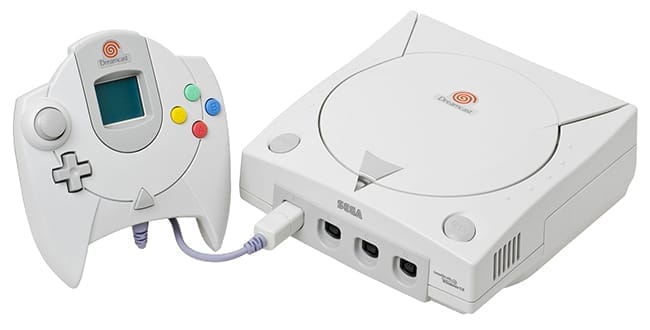A look back at the last SEGA Console.
[Editor's Note: Sorry we missed the birthday, we were having a little website issue. Better later than never! JRM]On November 9th, 1999, Sega unleashed the Dreamcast upon the United States. The first Sixth Generation console to be released, the Dreamcast would be the first launched console to feature built in internet connectivity as one of its selling points (1), with a built in 56k Dialup Modem. Owners could also purchase a Broadband adapter for Cable/DSL service. It was also the first console in the United States (2) to have an interactive memory unit, or a Memory Card that had a built in screen that could be used as a digital handheld for unlockable minigames, or would display tips or messages durring gameplay.
Unfortunately though, the Dreamcast ended up as a commercial failure due to weak Japanese sales at the time. This, coupled with the losses from sales of the Sega Saturn, would lead to the company ending production of the Dreamcast in 2001, and not being able to see a profit until 2003. The last game released on the Dreamcast in the United States was NHL 2k2.
Contrary to popular belief, the Dreamcast was not killed by piracy on the console, but due to a refocusing at SEGA on developing software instead (We at Techraptor.net discourage piracy in all applicable forms. If you want to show some love for what you enjoy, Buy it, don’t pirate). Luckily, the releases from Natural Born Chillers (Gameshark CDX), as well as Echelon (Boot Disc 1.1), would end up creating a Homebrew community on the Dreamcast due to the ease of running self-made applications. This homebrew community still exists and produces games for the console. A quick Google search shows some of the games being developed for it. Piers Solar (Originally developed for the Sega Megadrive and Genesis) was released for it, and another RPG called Elysian Shadows is currently in development as well.
My Experiences with the Dreamcast
Unfortunately, I actually didn’t get a Dreamcast until my birthday on August 16, 2001, almost 5 months after it had ceased to be produced (and wasn’t informed of this). I remember that it came with Sonic Adventure, which in my opinion is probably one of the best 3-D Sonic games to date, and Sonic Shuffle, a Mario Party rip-off with some of the meanest A.I I had ever encounter in a game. I also remember getting EGG Elemental Gimmick Gear (and I wasn’t that big a fan of it), as well as Record of the Lodoss war, a Diablo clone set in the Lodoss anime timeline.There were two games that I remember and still love to this day. One of them being Yu Suzuki’s “Shenmue”. I thought it was a nice change of pace for a game, when at the time all I remember playing was J-RPGs and occasionally Spyro the Dragon on my PlayStation. Shenmue to me was kind of like a breath of fresh air. It had a cinematic quality to it, and I honestly couldn’t stop playing it once I started. I remember that I would go from eight or nine in the morning, until eight or nine the next night just to find out what would happen next to Ryo.
The other game that I still love till this day is pretty obvious (because I think everyone who had a Dreamcast had it and was just as in love), and that’s Phantasy Star Online. PSO was essentially my very first Massively Multiplayer Online Role Playing Game. I think the reason I still love it to this day is because of its simplicity. You can register up to 6 commands, (3 normal, 3 requiring you to hold a trigger), and while you played, you’d eventually develop a rhythm for your attacks to do maximum damage. There was a fairly interesting story to it, and the pairing of the visuals and sounds blew me away.
So, Happy 15th birthday Dreamcast. May it be a fantastic one.
(While I hook up my Dreamcast and enjoy some Shen Hua, what were some of your favorite games or memories on the console? Let us know in the comments below!)
(1): Until this point, Online play hadn't been available for U.S. consoles through first party, and weren't a major selling point, also Sega Channel was a content delivery system instead of a internet multiplayer system.
(2): The United States was unable to get the PocketStation through retail, even though functionality was left in in some games, such as Final Fantasy VIII.
Have a tip, or want to point out something we missed? Leave a Comment or e-mail us at tips@techraptor.net













